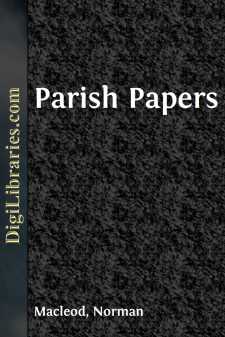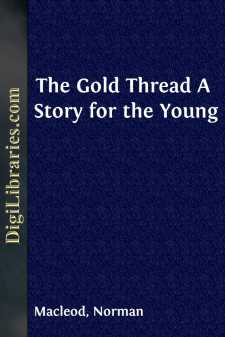Categories
- Antiques & Collectibles 13
- Architecture 36
- Art 48
- Bibles 22
- Biography & Autobiography 813
- Body, Mind & Spirit 142
- Business & Economics 28
- Children's Books 15
- Children's Fiction 12
- Computers 4
- Cooking 94
- Crafts & Hobbies 4
- Drama 346
- Education 46
- Family & Relationships 57
- Fiction 11828
- Games 19
- Gardening 17
- Health & Fitness 34
- History 1377
- House & Home 1
- Humor 147
- Juvenile Fiction 1873
- Juvenile Nonfiction 202
- Language Arts & Disciplines 88
- Law 16
- Literary Collections 686
- Literary Criticism 179
- Mathematics 13
- Medical 41
- Music 40
- Nature 179
- Non-Classifiable 1768
- Performing Arts 7
- Periodicals 1453
- Philosophy 64
- Photography 2
- Poetry 896
- Political Science 203
- Psychology 42
- Reference 154
- Religion 513
- Science 126
- Self-Help 84
- Social Science 81
- Sports & Recreation 34
- Study Aids 3
- Technology & Engineering 59
- Transportation 23
- Travel 463
- True Crime 29
Parish Papers
by: Norman Macleod
Description:
Excerpt
THOUGHTS ON CHRISTIANITY.
I.
WHAT IS CHRISTIANITY?
This question refers to a matter of fact. I do not ask whether the Christian religion is true, but only, What is the Christian religion? What is that religion which has existed for eighteen centuries; which is professed by Christendom; and which has been more precious than life itself to millions who have died in its faith, and is so still to millions who possess it as their peace and joy?
But how are we to obtain a satisfactory reply to this question? Are we to examine the opinions of all the various "churches," "sects," or "bodies," professing Christianity, in order to determine what it is they profess? If we adopted such a process of investigation as this, I believe we would reach, by a longer road, the very same point which may be reached by a shorter and more satisfactory process.
For I suppose it will be admitted that the Christian religion is what Jesus Christ and His apostles taught, and that we may rely upon the information conveyed to us in the New Testament as to the sum and substance of that teaching.
I do not even insist, as essential to my argument, upon the inspiration of Scripture, according to any theory whatever of that doctrine; but assume only that we have in the New Testament a true account of the teaching of Jesus Christ and His apostles, and that we are able, therefore, to ascertain from its pages what their Christianity was as an historical fact, with as much certainty, surely, as we can learn from the Koran what Mohammedanism was as taught by Mohammed, or from any work of philosophy what were the opinions of its author.
Now, if we read the New Testament with ordinary attention, we must, I think, be struck by one feature which is repeated in almost every page, and is manifestly the all-pervading spirit and life of its teaching,—that is, the peculiar place which Christ occupies in relation to all other persons mentioned there. This person, Jesus Christ, whoever He was, stands out prominently before every other teacher of Christian truth. The apostles speak of Him, point to Him, plead for Him, labour for Him. He is not the greatest Teacher merely among themselves, but the only Teacher, and they but His scholars, who glory in having nothing of their own to impart, and in being ministers, "stewards," only of what they have received from Him their Master. The subject of all their preaching is this Person—not a system of morality, or doctrines, or truths, apart from, but embodied in Him who was the Truth and the Life—Jesus Christ. The text of all their teaching is, "God forbid that we should know anything among you save Jesus Christ." In order to see this, take up any epistle, and mark how often the name of Jesus Christ appears as the ever-present thought, the centre of every idea.
Again, consider how this Person is inseparably connected with every motive, every duty, every joy and hope of the Christian as he is described in the New Testament. Christian love is there, not love merely in the abstract, (if such is in any case possible,) but love to Jesus Christ, and to all men because "in Christ" The grand question proposed is, "Lovest thou ME?" Christian obedience is not obedience merely to a code of moral precepts, but to Jesus Christ and "His commandments." Christian faith is not faith in "mysteries," or things unseen, or truths revealed, though such faith may be Christian, but its essence is faith in Jesus Christ the living Person; the supreme command being, "Believe in the Lord Jesus Christ." The Christian's hope is "hope in Christ;" his joy, "joy in Christ;" his peace, "peace in Christ;" his labour, "labour in Christ;" his strength, "strength in Christ;" his life, "life in Christ;" his death, "death in Christ;" his immortality, "rising in Christ;" his salvation, "salvation through Christ;" and his heaven, "to be with Christ!" On the other hand, all that is evil and disastrous to the soul is summed up in being "without Christ." To reject Christ, not to believe in Christ, to be enemies of Christ, to despise Christ, to be ignorant of Christ, to lose Christ, to be commanded at the last to depart from Christ—these are the characteristics of the wicked and lost: for "there is no other name given among men whereby man can be saved than the name of Jesus Christ."
You will observe that I am not at present discussing what Christ has done for us, but what, as a matter of fact, Jesus Christ claimed from us and from all men, and recognised to be the religion which He came to establish upon earth....



